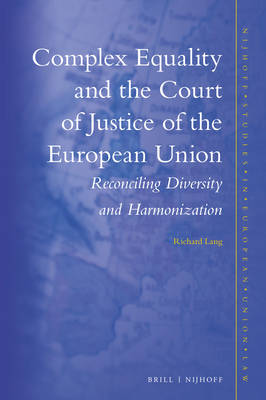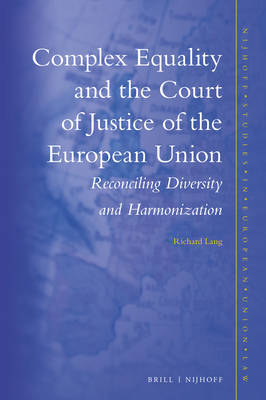
Je cadeautjes zeker op tijd in huis hebben voor de feestdagen? Kom langs in onze winkels en vind het perfecte geschenk!
- Afhalen na 1 uur in een winkel met voorraad
- Gratis thuislevering in België vanaf € 30
- Ruim aanbod met 7 miljoen producten
Je cadeautjes zeker op tijd in huis hebben voor de feestdagen? Kom langs in onze winkels en vind het perfecte geschenk!
- Afhalen na 1 uur in een winkel met voorraad
- Gratis thuislevering in België vanaf € 30
- Ruim aanbod met 7 miljoen producten
Zoeken
Complex Equality and the Court of Justice of the European Union
Reconciling Diversity and Harmonization
Richard Lang
€ 297,95
+ 595 punten
Omschrijving
The equality jurisprudence of the Court of Justice of the European Union has long drawn criticism for its almost total reliance on Aristotle's doctrine that likes should be treated like, and unlikes unlike. As has often been shown, this is a blunt tool, entrenching assumptions and promoting difference-blindness: the symptoms of simplicity. In this book, Richard Lang proposes that the EU's judges complement the Aristotelian test with a new one based on Michael Walzer's theory of Complex Equality, and illustrates how analysing allegedly discriminatory acts, not in terms of comparisons of the actors involved, but rather in terms of distributions and meanings of goods, would enable them to reach decisions with new dexterity and to resolve conflicts without sacrificing diversity.
Specificaties
Betrokkenen
- Auteur(s):
- Uitgeverij:
Inhoud
- Aantal bladzijden:
- 392
- Taal:
- Engels
- Reeks:
- Reeksnummer:
- nr. 14
Eigenschappen
- Productcode (EAN):
- 9789004299993
- Verschijningsdatum:
- 19/07/2018
- Uitvoering:
- Hardcover
- Formaat:
- Genaaid
- Afmetingen:
- 155 mm x 235 mm
- Gewicht:
- 747 g

Alleen bij Standaard Boekhandel
+ 595 punten op je klantenkaart van Standaard Boekhandel
Beoordelingen
We publiceren alleen reviews die voldoen aan de voorwaarden voor reviews. Bekijk onze voorwaarden voor reviews.









